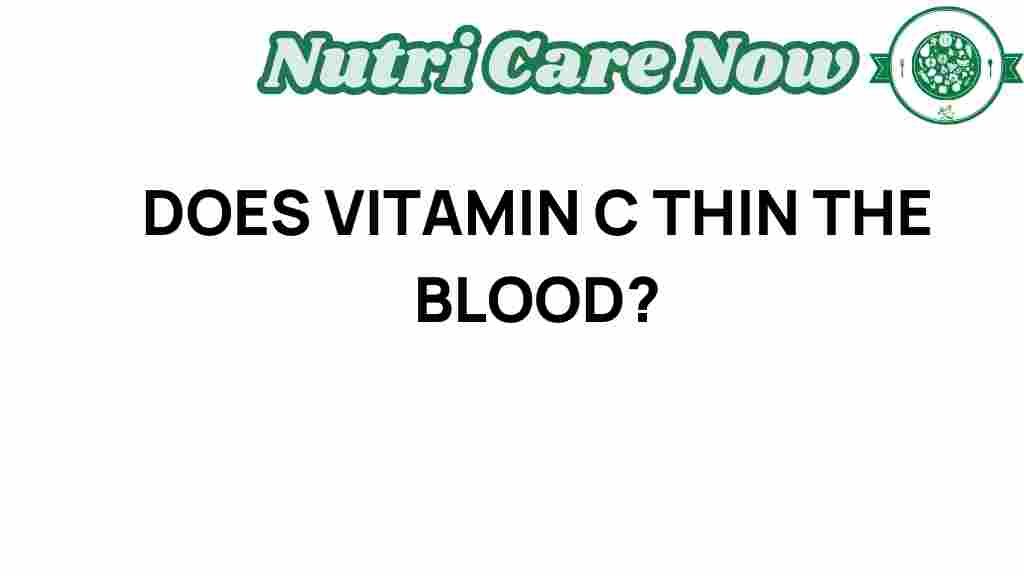Unraveling the Mystery: Does Vitamin C Really Thin the Blood?
Vitamin C is often hailed as a vital nutrient that supports our immune system, enhances skin health, and acts as a powerful antioxidant. However, one question that frequently arises is: does Vitamin C really thin the blood? This article aims to explore this topic thoroughly, examining the health benefits, nutritional value, and dietary myths surrounding Vitamin C and its impact on blood thinning.
The Role of Vitamin C in Health
Vitamin C, also known as ascorbic acid, is an essential nutrient that plays a pivotal role in various bodily functions. Here are some notable health benefits of Vitamin C:
- Immune System Support: Vitamin C is crucial for the functioning of immune cells, helping the body fight off infections.
- Antioxidant Properties: It acts as a powerful antioxidant, neutralizing free radicals that can cause cellular damage.
- Collagen Synthesis: Vitamin C is vital for the production of collagen, which aids in skin elasticity and wound healing.
- Absorption of Iron: It enhances the absorption of non-heme iron from plant-based foods, preventing anemia.
These benefits highlight the importance of including Vitamin C in our diet, either through foods or supplements.
Understanding Blood Thinning
Blood thinning refers to the reduction of blood viscosity, making it easier for blood to flow through the vessels. This is often a desired effect in individuals at risk of clotting disorders or cardiovascular diseases. Common blood-thinning medications include aspirin and warfarin. But where does Vitamin C fit into this picture?
Does Vitamin C Thin the Blood?
The relationship between Vitamin C and blood thinning is complex and often misunderstood. Here are the key points to consider:
- Scientific Studies: Some studies suggest that high doses of Vitamin C may have a mild anticoagulant effect, but the evidence is not conclusive. Most research indicates that normal dietary intake of Vitamin C does not thin the blood significantly.
- Vitamin C and Platelet Function: Vitamin C can influence platelet function, which is crucial for blood clotting. However, its effect is generally considered weak compared to pharmaceutical blood thinners.
- Recommended Dosage: The recommended daily allowance (RDA) for Vitamin C is 75 mg for women and 90 mg for men. These amounts are typically sufficient for maintaining overall health and do not pose a risk of excessive blood thinning.
Sources of Vitamin C
To reap the health benefits of Vitamin C without worrying about blood thinning, it’s essential to consume it through natural food sources or supplements. Here are some excellent sources of Vitamin C:
- Citrus Fruits: Oranges, grapefruits, and lemons.
- Berries: Strawberries, blueberries, and raspberries.
- Vegetables: Bell peppers, broccoli, and Brussels sprouts.
- Supplements: Vitamin C tablets, powders, and gummies are available for those who may not get enough from their diet.
Vitamin C Supplements: Are They Necessary?
While most people can obtain sufficient Vitamin C from a balanced diet, supplements can be beneficial for certain groups:
- Individuals with Limited Access to Fresh Produce: Those living in areas with limited access to fruits and vegetables.
- People with Specific Health Conditions: Conditions that affect absorption or increase the need for Vitamin C.
- Aging Population: Older adults may require additional Vitamin C for immune support and skin health.
Before starting any supplement regimen, it’s advisable to consult with a healthcare provider to ensure it aligns with personal health needs.
Debunking Dietary Myths Surrounding Vitamin C
As with many nutrients, there are several myths and misconceptions about Vitamin C that can lead to confusion. Here are a few common dietary myths:
- Myth 1: High doses of Vitamin C can cure the common cold. While Vitamin C can support immune function, it doesn’t prevent or cure colds.
- Myth 2: Vitamin C is only found in citrus fruits. Many other fruits and vegetables are rich in Vitamin C.
- Myth 3: More Vitamin C equals better health. Excessive amounts can lead to gastrointestinal issues and are unnecessary.
Potential Side Effects of Excessive Vitamin C
While Vitamin C is generally safe, excessive intake can lead to side effects, particularly if taken in supplement form. Some potential side effects include:
- Nausea and diarrhea
- Stomach cramps
- Increased risk of kidney stones in predisposed individuals
It’s crucial to adhere to the recommended daily intake unless advised otherwise by a healthcare provider.
How to Incorporate Vitamin C into Your Diet
Incorporating Vitamin C into your daily diet is simple and delicious. Here are some tips:
- Add citrus fruits to your breakfast, like oranges or grapefruit.
- Snack on raw bell peppers or cherry tomatoes for a refreshing treat.
- Include berries in smoothies or yogurt for a nutritious boost.
- Experiment with salads that include leafy greens and citrus dressing.
Consulting Healthcare Professionals
Before making significant changes to your diet or supplementing with Vitamin C, it’s wise to talk to a healthcare professional. They can provide personalized advice based on individual health conditions and dietary needs. For more information on dietary needs, you can visit Nutrition.gov.
Conclusion
In summary, Vitamin C is a powerful nutrient with numerous health benefits, particularly for the immune system and skin health. While there is some evidence that high doses may have a mild blood-thinning effect, normal dietary intake is safe and beneficial for most people without significantly impacting blood viscosity.
As with any aspect of nutrition, it’s essential to separate fact from myth. By understanding the role of Vitamin C in our diet and overall wellness, we can make informed decisions about our health. Embrace the abundance of Vitamin C-rich foods, and enjoy the myriad of health benefits they bring while maintaining a balanced approach to nutrition.
For further reading on Vitamin C and its health implications, check out this external resource.
This article is in the category Health and created by NutriCareNow Team
